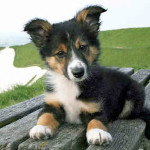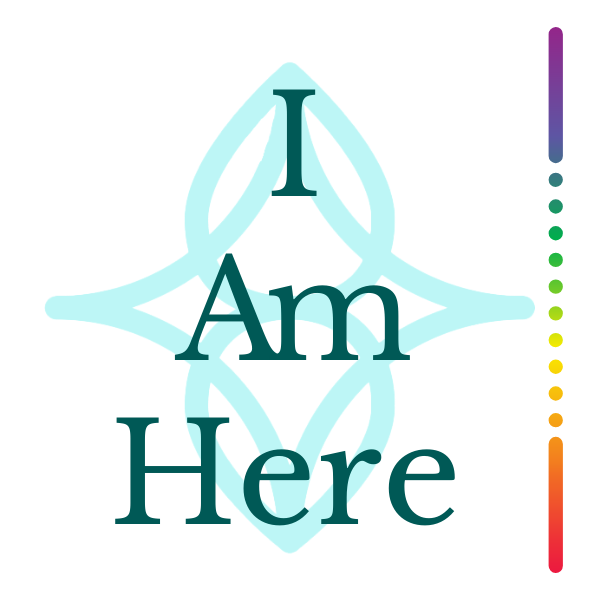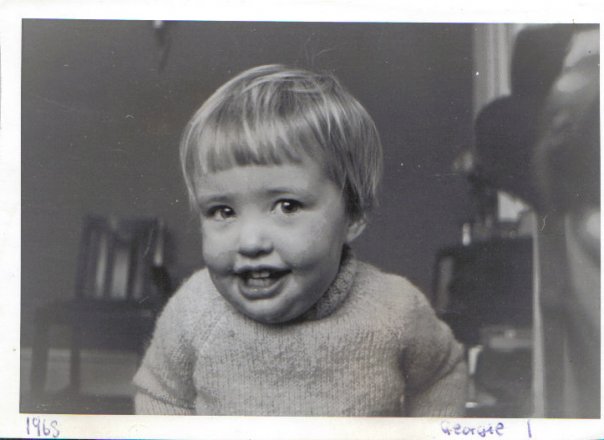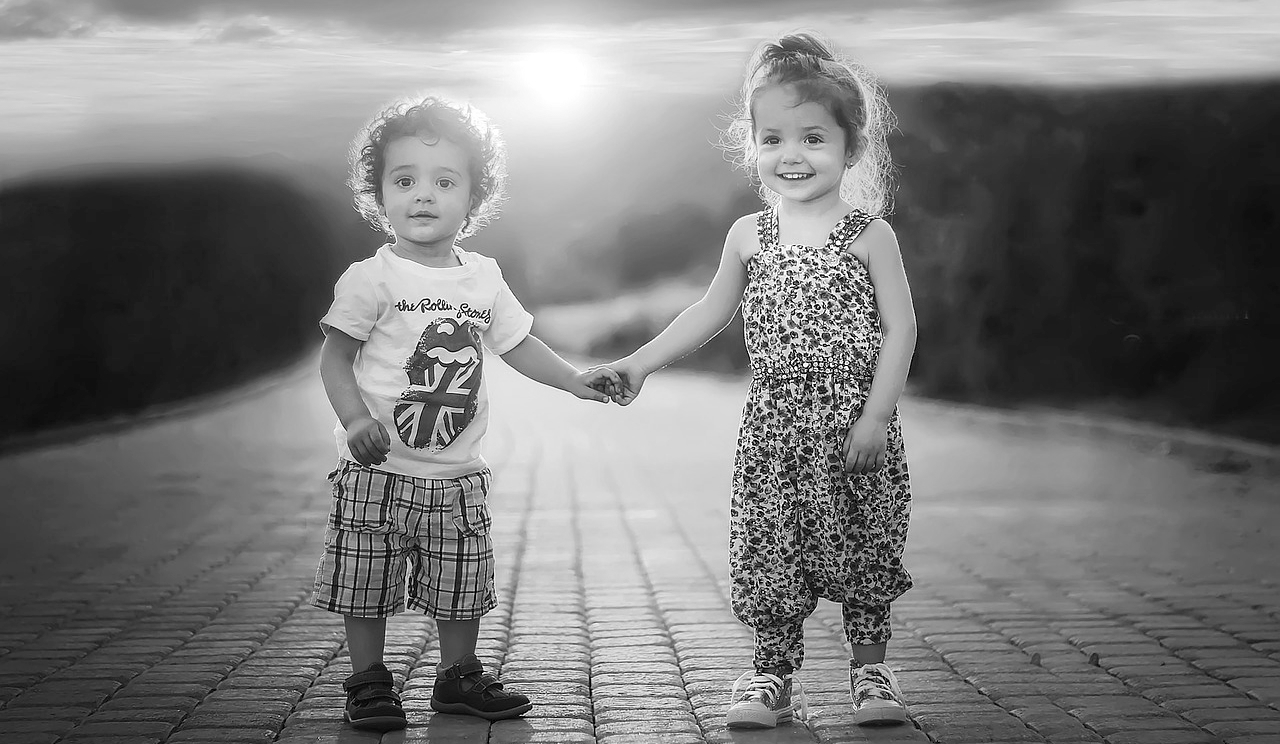Oliver, my elder brother by two years, was an inseparable part of my life. Even in the womb, I experienced myself responding to his voice and reaching out in unison with the energy of my mother towards his cry. On that autumn morning, as I slept, freshly born, in a wicker Moses basket by the side of my parent’s bed, two-year-old Oliver came in and pointed at the thing on the floor. “What’s that?” he asked. “Your baby sister,” replied my mother. Oliver wasn’t impressed and chose to ignore me for a year, when he dragged me to my feet, forced my first steps and put a red towel over my shoulders to declare that I was Robin and he was Batman.
I have early memories of being dragged through the living room window, into the garden while our mother slept on the sofa. I recall him pulling me downstairs to the Christmas tree where the presents were neatly arranged, and joining him in a mania of jumping up and down squealing: it’s Christmas!
Granny Johnson had ordered us a subscription of Beano and Dandy comics. We fell in love with Dennis the Menace and Gnasher. Soon, we were making our own comics, and Oliver had the idea of cutting a handful of fur off our cross-bred collie dog Rufus to tape to the front cover as a free gift.
We had many imaginary characters. I was Amamorse, a bizarre, unrepressed salivating character that would speak loudly in a drawly discord. He was Do You Stink?, as well as Bollard (Bollard liked to thump me), and others. We fought whole tournaments between these characters in the spare room, bouncing on the bed.
It didn’t seem exceptional at the time, but a lot of our games were inspired by Oliver into a kind of morbidity. We killed off Doogle the dog (a hairy toy from the Magic Roundabout on TV) and buried him behind the bushes at the front of the house (where another imaginary friend, Ghosty hung out near the leaking sewer). The sense of guilt around the assassination of this toy was disproportionately grim.
When my parents would hold a party for business associates, we needed to disappear. So we would stand in our pajamas, peeping over the balcony at the guests. Oliver’s idea was that we would spit on them from above and hide. Yes, we did that. Gazing over the balcony at the people arriving for a party of my parents, a man entered once with only one arm. Oliver was fascinated. We lay a trap for him of a toy frog connected to an air sack that when squeezed would croak. Oliver put the toy near the entrance to the toilet and we waited. When the one-armed man came up, he heard us laughing. Oliver prodded me and told me to ask THE question. “Why do you only have one arm?” The sweet man smiled and said he was born that way. Neither of us expected that answer. We debated for a long time if it could be true.
When bad things happened, such as when the steering wheel of my father’s new car came off in his hands, mid-drive, Oliver had a kind of grim knowing about him. He noticed the dead, the disgusting, and the failed. He would fetch me especially to look at the corpses of birds that had crashed unwittingly into the windows. In the fields behind our house was a shed with a dead cat inside in a box. It was covered with a stale rag. We would go back there to witness the stages of rotting corpse.
It seemed normal at the time, but looking back, it seems like it confirmed something in Oliver. He noticed horror and disaster with the heart of one that seemed to have determined that disaster is inevitable. I’m not sure that I would have spent so much time with the dark side of death if Oliver had not been my brother.
The other time he would get that dark look of condemnation was when we went to the Catholic church with my mother. An expression would appear on his young face as if he would send them all to the pit of hell if he could. There was a sense of disgust and brooding outrage. Spiritual hypocrisy was a major trigger for Oliver. Later, it would be all forms of hypocrisy.
Six months before my father’s death, there is a photo of Oliver scowling into the camera. My father was the photographer. Although neither of them knew it, this was the last meeting between them. It was the accusing gaze through which Oliver perceived the implosion of authority. Quite different from the photographs my father took of me. I look terrified, but I’m smiling broadly into the face of it. Two kids. Same circumstances, but a different attitude, a different strategy, a different degree of a priori happiness deep inside.
Few seem to dig too deeply into children’s minds and hearts, and perhaps that’s a blessing in adult disguises. From the outside, we were both seen as happy, balanced children, adjusting easily to the separation and divorce; still enjoying a close-knit bond with our mother and the sporadic visits with our very successful father.
No one could tell in advance how the broken promises, the perpetual, stagnant smell of alcohol and extinguished cigarettes, the hours spent waiting outside pubs in the car with two packets of salt and vinegar flavoured crisps, and the screaming, almost hysterical rows between our parents were effecting us beneath the surface. We knew. We would just look at each other and know it beyond words. But to others, it was invisible.
There is an early letter I wrote to God as a pre-schooler, in infant phonetics.
DEAR GOD PLEASE HELP MUMMY AND DADDY
BECAUSE YOU KNOW HOW WE ARE.
I’M SO TIRED.
ZZZZZZZZZZZZZZZZZZZ
 We had a kitten, Sweeny Toddler, and she used to join us and our dog Rufus to walk across the cricket pitch to meet my mother from her work at a small chemical factory. Sweeny thought she was a dog and would pant with her little pink tongue hanging out. In a way, Rufus had adopted her. When we brought her home from a nearby farm, he licked her until she was drenched.
We had a kitten, Sweeny Toddler, and she used to join us and our dog Rufus to walk across the cricket pitch to meet my mother from her work at a small chemical factory. Sweeny thought she was a dog and would pant with her little pink tongue hanging out. In a way, Rufus had adopted her. When we brought her home from a nearby farm, he licked her until she was drenched.
Often, Rufus and Sweeny would sit together in front of our house, and as Rufus would chase other cats, Sweeny would watch, casually washing her face with a certain cat-like smugness. Our mother was dating new men, and we had a lot of joy with the American soldiers from the nearby US base Upper Heyford. As a child, I used to call that strange, barbed wire compound “America”. Children don’t do countries, they tend to identify places according to people. At Israel’s Ben Gurion airport recently, on the way to the long-term parking, I heard a child innocently ask his mother after a long flight: “When do we get to Israel?” To a child, there are no real borders, just differences of another nature.
Most of the time we were left home alone, we were OK. But one evening, it was different. We had been watching a TV series called Beasts, and in one episode a young couple had been eaten alive by rats. It was climatic and horrifying. But we never really thought about it, until that evening, months later.
We settled down on the beige woolly carpet to watch TV, and our mother went out for the evening. As we sat there, I heard a faint scratching noise. It seemed to be coming from inside the wall. I was freaked out. “Shhhhhh! Listen!” I hissed to Oliver, in a panic: “RATS!” He thought I was just trying to scare him. But then, when he turned down the sound of the TV and we both listened, there it was again: this strange scratching sound from different places within the wall.
We became cold with fear. We were terrified. As if moving in slow motion, we grabbed out coats and left the house. Oliver was the hero. We stood outside and didn’t dare to go back in. The surface of our skin felt already raw, as if gnawed by vicious teeth.
We began walking around the green circle of our housing estate. Rufus was with us, but Oliver was suddenly worried about Sweeny the cat. The rats would certainly kill her and eat her alive. With tremendous courage he went back, white as a chalk, to rescue her. In terror, we stomped like interns with the animals around and around. I saw the lights inside the houses of the neighbors and wanted to go inside to tell them and ask for help. Oliver wouldn’t let me.
That was a difference between us: I was always able to reach out for help, Oliver wouldn’t. He was too severely ashamed. We must have circled the green for hours, and it grew dark. At a certain stage, the need to pee was so great that we walked up toward the town, to relieve ourselves behind a giant billboard. At that moment, we saw our mother and her date Jim walking home.
The relief was astounding. All fear was gone, as if there were no rats at all. On investigation, my mother discovered that there were birds nesting in the loft.
When our mother began dating our future step father Jim, she had a deadline. She had to decide to marry him within several months as the American company he worked for had promoted him to a job in Brussels. It was a hard call for her to take, to agree to move with two young children to a foreign country. When she found out she was pregnant (with my future younger sister), the decision was partly taken for her. Still, she prayed for a sign. Later, she said that she had the thought: “Let something happen to Rufus.” The stress of immigration (also with an undisciplined, energetic dog) was perhaps more than she could handle.
Anyway, not long after, Rufus was bitten by an Alsatian dog. He often got wounded in scruffs, but this time, his blood got poisoned and he didn’t get better. When our mother told us in the morning that Rufus was dead, I couldn’t believe it. It just wouldn’t stay in my mind. I had experienced reoccurring nightmares about this, dreams within dreams in which my mother would tell that Rufus was dead and I would wake her up to find that he really lived. It seemed this was also a dream. It was horrifying, impossible to take in.
For our mother, the idea that the thoughts within her prayer had been answered like this was also horrific. She had asked for a sign, and in a terrible way, the ‘sign’ had come.
That morning in the school playground, I was in a kind of freeze. Death wasn’t a game any more. It was among us. The impossible was possible and a fluid reality seemed to become ice. My father told me that he had learned about the death of the family dog Rufus by overhearing a conversation about it at the next table in the pub. He had understood it was his dog, and had come over.
In so many ways, the death of Rufus embodied the death of the family, and the approaching death of our father. After Rufus was gone, we began packing for our new life in Belgium. Stress was showing in varying forms of psychosis of irrational fear, in which the borders between imagination and belief were breaking down. Already, areas of stress were going into deep freeze as depression to eat later.
When we left to Belgium, we were also saying good bye to the identity of England, its ethos and its safety. England as a bounded reality died in us. It was the end of a chapter, and the end of the formal connection with our father. From now on, that bond would be more imaginative than physical, based on spontaneous packages, unpredictable and rare visits, a lot of fantasy, and the final meeting six years later at a crematorium in Warwickshire.
To be continued




